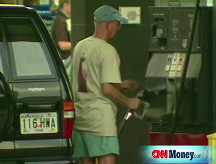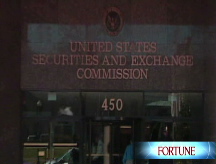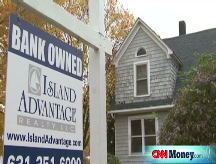Stocks manage gains in uneven trading
Markets end up in positive territory even as early enthusiasm on oil and the economy is tempered by dour news from the financial sector.

NEW YORK (CNNMoney.com) -- Wall Street endured a choppy session Friday, but finished higher as encouraging economic indicators outweighed investors' fears about financials.
The Dow Jones industrial average (INDU) ended the session up 21 points, finishing about 0.2% higher. Stocks tumbled Thursday, with the Dow losing 283 points, and all of the major gauges fell about 2%.
The broader Standard & Poor's 500 index (SPX) advanced 0.4% Friday. But the tech-heavy Nasdaq composite index (COMP) fared much better, climbing 1.3%, led by strong earnings from Juniper Networks.
Stocks rose after the opening bell as investors cheered a surprise rise in factory orders. The advance continued as oil prices began to decline sharply and a housing market report dealt a much softer-than-expected blow.
But blue chips fell from their highs - briefly into negative territory - after Standard & Poor's said the mortgage meltdown has led to investor fears about the credit positions of government-backed mortgage finance giants Freddie Mac and Fannie Mae.
Though S&P affirmed Fannie and Freddie's AAA credit ratings, the ratings firm put the mortgage financers on a negative credit watch list and said it may lower its ratings after a further review. (Full story).
"The market turned on the S&P's remarks on Freddie and Fannie," said Peter Cardillo, chief market economist with Avalon Partners. "That overshadowed some of the good economic data we had earlier."
Investors will see if the market can sustain a rally on Monday, a day devoid of any scheduled economic reports. Kraft Foods (KFT, Fortune 500) and Verizon Communications (VZ, Fortune 500) will report on quarterly earnings before the bell.
Economic news: Orders for durable manufactured goods rose unexpectedly in June, according to a U.S. Commerce Department report released Friday. Orders to factories for big-ticket items like cars, appliances and machinery rose 0.8% last month, far surpassing economists' forecast of a 0.4% decline. (Full story).
Also sending stocks up was an encouraging report on new home sales. Sales of new homes fell 0.6% in June to an annual sales rate of 530,000, from an upwardly revised rate of 533,000 in May, according to the U.S. Census Bureau. Despite home sales slipping, that level was well above economists' expectations. (Full story).
Investors cheered the news from the battered U.S. housing market, especially as Thursday had brought a weak report on sales of homes by homeowners. Existing home sales slipped 2.6% in June, according to the National Association of Realtors.
"All the economic news came in better than expected Friday," said Cardillo. "Investors engaged in a relief rally after Thursday's major decline."
Wall Street also embraced news that consumer confidence got a larger boost in July than previously reported, according to a consumer sentiment survey conducted by Reuters and the University of Michigan. The revised index number came in at 61.2 in July, up from a preliminary reading of 56.6 for July and from 56.4 in June.
"Consumer sentiment is obviously behind the rally," said Cardillo. "That's a very encouraging sign."
Financials sink: A day after weak economic indicators put a damper on a strong recent run by financial stocks, banks continued their slump Friday, preventing market gauges from making up more lost ground.
"Obviously there are still some ongoing concerns about the financial sector," said Cardillo. "At the moment, they're under pressure, pulling back after a strong runup."
Government-backed mortgage financiers Fannie Mae (FNM, Fortune 500) and Freddie Mac (FRE, Fortune 500) both slipped for the second straight session after the House passed a rescue bill Wednesday that will throw government support behind the struggling home-loan finance giants.
Shares fell further before recovering some after the S&P released its statement on the firms, saying investors could lose everything if the government bails out the firms. Fannie fell 3.9% and Freddie slipped 6.1% on Friday.
Other banks also continued Thursday's losses. Wachovia (WB, Fortune 500) slipped 7.6%, still reeling from a Thursday downgrade by a Morgan Keegan analyst. Citigroup (C, Fortune 500) lost 1.1% and Bank of America (BAC, Fortune 500) fell 3.5%.
But Washington Mutual (WM, Fortune 500), whose stock dove more than 13% Friday morning, recovered most of the losses after the battered savings and loan confirmed that it had beefed up its liquidity to more than $50 billion. The company previously had said that its liquidity was $40 billion as of the end of the second quarter. Shares finished the day down 4.7%. (Full story).
Oil: Oil prices fell $2.23 to settle at $123.26 per barrel on renewed concerns about demand destruction. Crude has plummeted $24 from its high of $147.27 set on July 11. (Full story).
"Any further break in oil would certainly lift Wall Street's spirits," said Cardillo. "For instance, if we could fall below $120, that would encourage investors."
Corporate news: Techs got a big boost Friday as network equipment maker Juniper Networks (JNPR) reported a 40% gain in quarterly earnings and boosted its full-year outlook. Shares jumped 17.7% Friday.
A day after Ford Motor (F, Fortune 500) reported its worst quarterly loss in company history, Honda Motor (HMC) reported a record profit for its fiscal first quarter. The Japanese carmaker said U.S. sales slumped, but sales grew rapidly in new markets. Shares still fell 2.3%. (Full story).
Video-rental company Netflix (NFLX) said profit rose 4%, boosted by an increase in subscriptions and the introduction of a set-top box that can deliver streaming video directly to a customer's television. Shares were up 4.2% Friday.
Market breadth was positive. On the New York Stock Exchange, advancers topped by a 3-to-2 ratio on a volume of 1.3 billion shares. On the Nasdaq, winners edged out losers on a 3-to-2 ratio on a volume of 2 billion shares.
Gas prices: The average price of gasoline fell 2 cents to $4.006 per gallon in the United States, declining for the eighth straight day, according to a daily survey from motorist advocacy group AAA. It was gasoline's lowest level since June 7, when the average crossed $4 for the first time. (Full story).
Other markets: In currency trading, the U.S. dollar was mixed against global currencies. The greenback rose against the Japanese yen, but fell a bit against the euro and British pound. (Full story).
COMEX gold for August delivery rose $4.50 to settle at $926.80 an ounce.
Treasury prices fell Friday, bringing the yield on the benchmark 10-year note up to 4.11% from 4.01% late Thursday. Bond prices and yields move in opposite directions. (Full story). ![]()
The 'it-coulda-been-worse' market
50 years of profit swings
Obama vs. McCain: Energy, taxes, more
How safe is your money, and how to protect it
Issue #1: America's money
Energy Fix
2008 Fortune 500
World's 25 biggest companies
Big banks' dividend gamble
Big tech getting weaker





